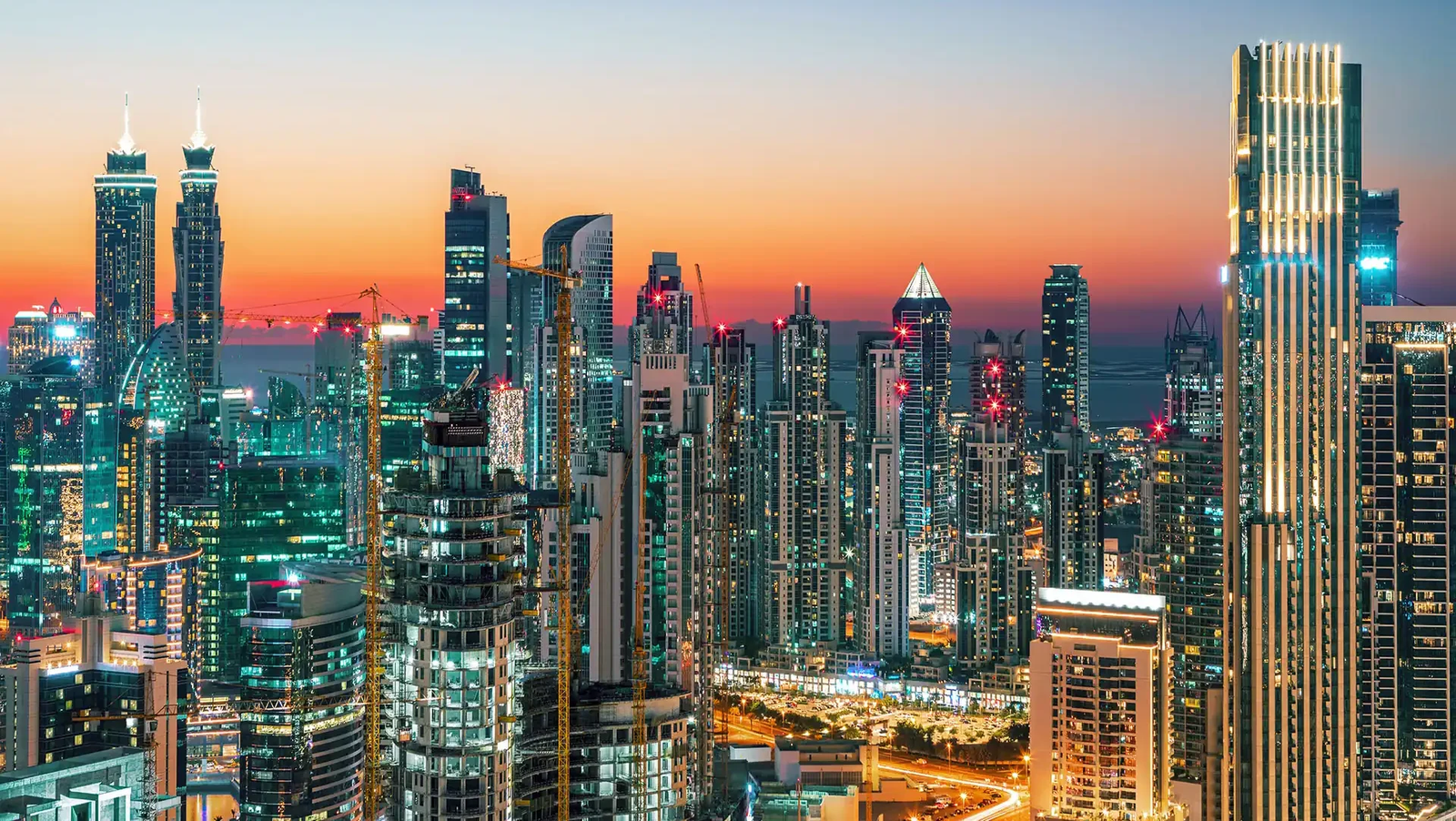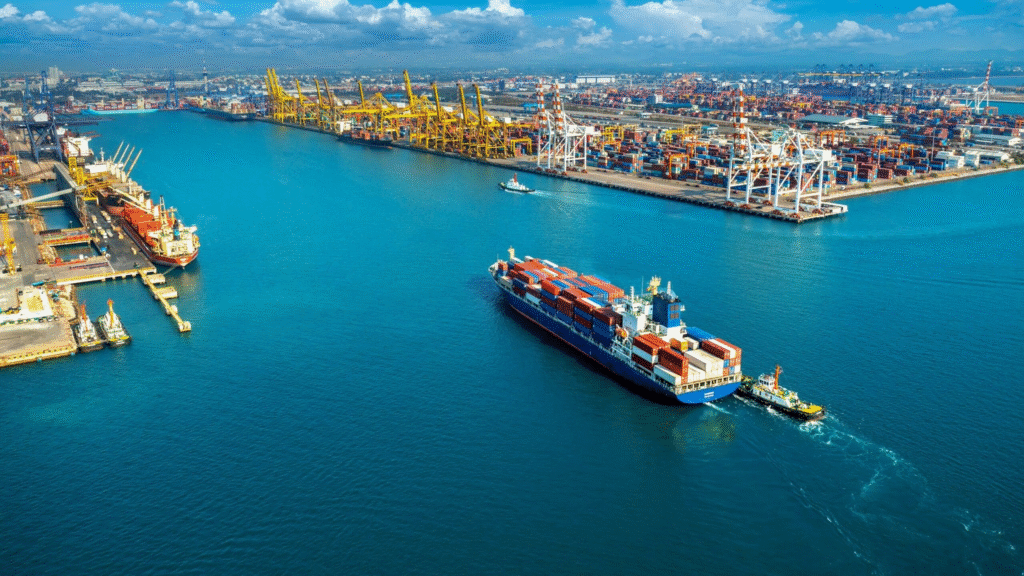
The UAE’s success as a trade hub begins with its location. Situated at the crossroads of Asia, Europe, and Africa, the country provides easy access to some of the world’s fastest-growing markets. Within an eight-hour flight, businesses can reach nearly two-thirds of the global population.
This strategic position allows the UAE to serve as a natural gateway for goods moving between the East and West. Whether it is oil and gas, electronics, textiles, or food products, the UAE is often the central point where international trade routes converge.
A strong location is only valuable if supported by modern infrastructure and the has invested heavily in this area. The country’s ports, especially Jebel Ali Port in Dubai, are among the busiest and most advanced in the world. Jebel Ali is the largest man-made harbor and the ninth busiest container port globally. It serves as a hub for shipping lines, offering seamless connections to over 150 ports worldwide.
In addition, the UAE has developed state-of-the-art logistics zones like Dubai’s JAFZA (Jebel Ali Free Zone) and Abu Dhabi’s Khalifa Industrial Zone (KIZAD). These free zones provide world-class facilities, tax benefits, and simplified regulations that attract multinational companies. Global giants such as Unilever, Nestlé, and Procter & Gamble have chosen the as a base for their regional operations because of these advantages.
The integration of advanced digital technologies in logistics, from AI-powered tracking systems to blockchain-based customs clearance, ensures that trade flows efficiently and securely.

While seaports remain vital, the UAE has also built an unmatched reputation in aviation and air cargo services. Dubai International Airport (DXB) and Abu Dhabi International Airport are major global hubs for both passengers and freight. Emirates SkyCargo and Etihad Cargo have become leaders in transporting goods ranging from pharmaceuticals to luxury goods across continents.
This combination of maritime and air connectivity makes the one of the most connected nations in terms of trade logistics. Businesses can move products quickly, reliably, and cost-effectively, which further strengthens the country’s role as a trade gateway.
Another reason the UAE stands out is its pro-business environment. The government has created more than 40 free trade zones, each designed to meet the needs of different industries. These zones offer full foreign ownership, zero corporate tax, and duty-free import and export benefits.
The recent decision to introduce a modest 9% corporate tax, while still among the lowest globally, has been carefully structured to maintain competitiveness. Combined with simplified business registration processes and digital government services, the UAE has become a top choice for investors looking to expand into the Middle East and beyond.
Global supply chains are shifting due to geopolitical challenges and disruptions like the COVID-19 pandemic. Many companies are searching for stable, well-connected bases to ensure resilience. The UAE has positioned itself perfectly in this landscape.
By investing in advanced logistics, renewable energy, and smart trade solutions, the country has become a reliable partner for businesses seeking to reduce risk and ensure continuous operations. This is why companies in industries such as e-commerce, technology, pharmaceuticals, and manufacturing are increasingly using the UAE as a hub for global distribution.
The UAE’s influence is also seen in its growing list of trade agreements and international partnerships. The country is part of the Gulf Cooperation Council (GCC) Customs Union and has signed Comprehensive Economic Partnership Agreements (CEPA) with nations including India, Israel, Indonesia, and Turkey.
These agreements are designed to reduce tariffs, simplify customs procedures, and boost investments between the UAE and its partners. For example, the UAE-India CEPA, signed in 2022, is expected to increase bilateral trade to over $100 billion within a few years.
The UAE is also strengthening ties with African nations, recognizing the continent’s growing role in global trade. Its investment in ports, logistics, and infrastructure across Africa highlights its vision of becoming a true global connector.

Although oil and gas remain central to the UAE’s economy, the country has successfully diversified into other sectors. Non-oil trade now contributes more than 70% of the UAE’s GDP. Key industries include aviation, logistics, real estate, technology, renewable energy, and financial services.
Dubai, for instance, has built a reputation as a leading hub for gold and diamond trading. Meanwhile, Abu Dhabi has invested heavily in industrial production, clean energy projects, and advanced manufacturing. This diversification not only reduces dependence on oil but also ensures the UAE’s relevance in the rapidly changing global economy.
The UAE’s vision is not limited to traditional trade. The government is actively building a digital economy with initiatives such as Dubai Blockchain Strategy, Abu Dhabi’s Hub71 for startups, and the adoption of artificial intelligence in customs and logistics.
E-commerce giants like Amazon and Noon have chosen the UAE as a regional hub, reflecting the growing importance of digital trade. The country is also exploring opportunities in fintech, cryptocurrency regulation, and smart contracts to streamline international transactions.
Looking ahead, the UAE aims to further cement its role as a trade leader through initiatives such as Dubai Silk Road Strategy and Abu Dhabi’s Economic Vision 2030. These programs focus on strengthening connectivity, attracting global talent, and creating a sustainable economy driven by innovation.
Sustainability is also a core part of this vision. With the UAE hosting COP28 in 2023, the government highlighted its commitment to green logistics and renewable energy. By balancing economic growth with environmental responsibility, the UAE is shaping the future of trade in a more sustainable way.
The UAE’s rise as the gateway for international trade in the Middle East is no accident. It is the result of visionary leadership, strategic investments, and a commitment to creating a business-friendly environment. From world-class ports and airports to forward-looking trade policies and digital innovation, the UAE has transformed itself into a vital link between global markets.
As supply chains continue to evolve and new trade opportunities emerge, the UAE will remain at the heart of international commerce, driving growth not just for the Middle East but for the entire world.
READ MORE:- Inside the World of Business Acquisitions: Secrets of Corporate Growth 2025
